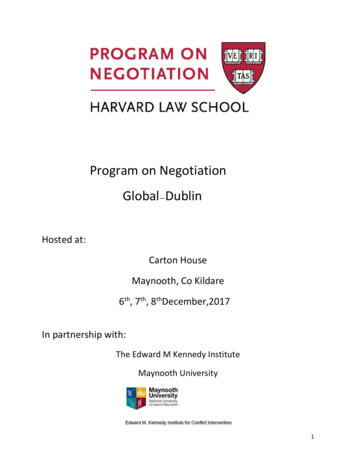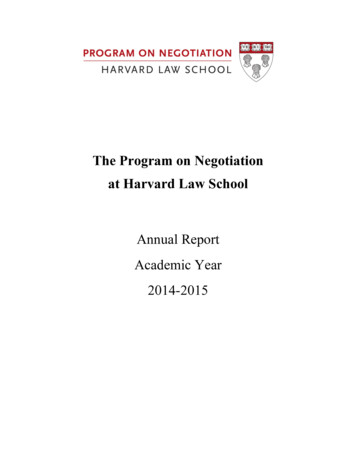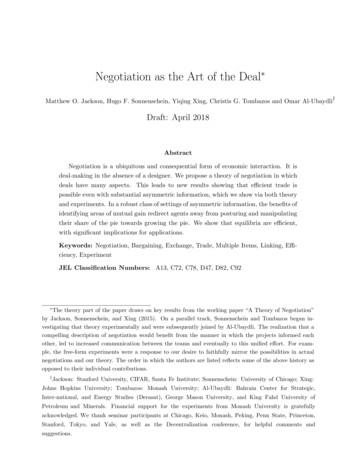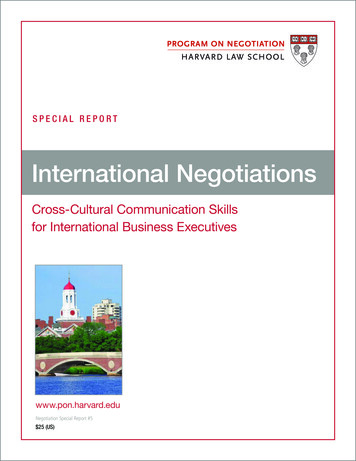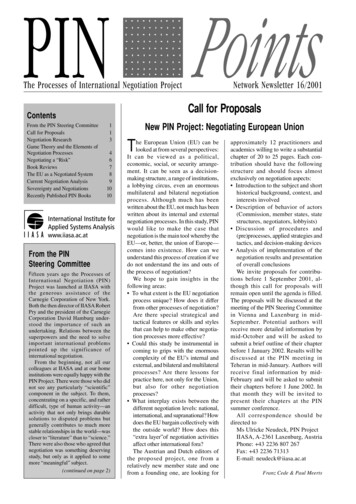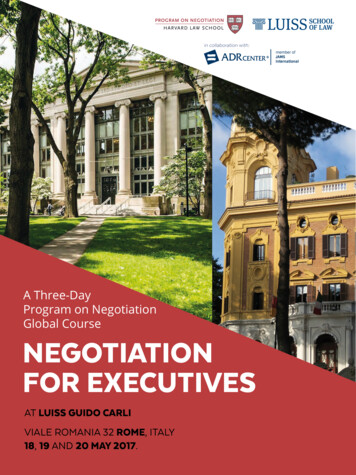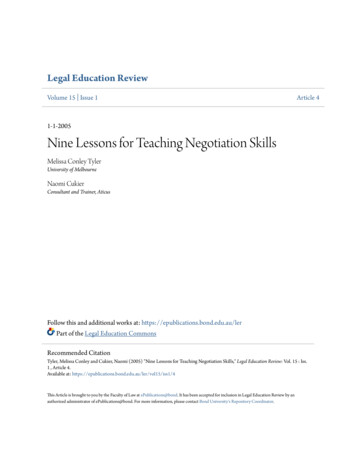
Transcription
Legal Education ReviewVolume 15 Issue 1Article 41-1-2005Nine Lessons for Teaching Negotiation SkillsMelissa Conley TylerUniversity of MelbourneNaomi CukierConsultant and Trainer, AticusFollow this and additional works at: https://epublications.bond.edu.au/lerPart of the Legal Education CommonsRecommended CitationTyler, Melissa Conley and Cukier, Naomi (2005) "Nine Lessons for Teaching Negotiation Skills," Legal Education Review: Vol. 15 : Iss.1 , Article 4.Available at: This Article is brought to you by the Faculty of Law at ePublications@bond. It has been accepted for inclusion in Legal Education Review by anauthorized administrator of ePublications@bond. For more information, please contact Bond University's Repository Coordinator.
Tyler and Cukier: Nine Lessons for Teaching Negotiation SkillsNine Lessons for TeachingNegotiation SkillsMelissa Conley Tyler* and Naomi Cukier**Negotiation is a key skill for legal practice and one thatoffers a rich theoretical literature as well as opportunities forexperiential learning. However, it can be a challenging skill toteach both in the law school and law firm environment. Manyteachers have limited time and resources and may be temptedto fall back on a fairly basic model for teaching negotiationskills.This paper outlines research that is showing new andinnovative ways of teaching negotiation skills. While bestpractice is still evolving, there are a number of clear insightsfrom work to date. Practical suggestions for class activitiesare offered including in areas such as observation of experts,emotional intelligence and analogical reasoning.The authors draw on their experience teaching negotiationskills to both students and practitioners. Their experience isvaried, ranging from groups of 5 to 180, and includes bothlaw school, law firm, government, corporate and non-profitclients in Australia, New Zealand, South Africa and the USA.In particular, the authors draw on experiences with smallgroup and on-line negotiation teaching with law students atthe University of Melbourne and Monash University.A Negotiation and Negotiation SkillsAt least since the early 1980s, negotiation has been seen asan area of theoretical inquiry as well as day-to-day practice.1*Senior Fellow, Faculty of Law, University of Melbourne and formerProgram Manager, International Conflict Resolution Centre.** Consultant and Trainer, Aticus.1 Key texts include H Raiffa, The Art and Science of Negotiation (Cambridge,MA: Harvard University Press, 1982) for its theoretical insights and RFisher, W Ury & B Pa on, Ge ing to Yes (New York: Penguin Books, 1981)for its ability to introduce negotiation theory to a wide audience. Otherpioneers include GI Nierenberg, Fundamentals of Negotiating (New York:Hawthorn Books, 1973); D Druckman ed, Negotiations, social-psychologicalperspectives (Beverly Hills: Sage Publications, 1977); H Cohen, You canPublished by ePublications@bond, 2005LER Vol 15-1.indb 6130/01/2006 8:49:15 PM
Legal Education Review, Vol. 15 [2005], Iss. 1, Art. 462LEGAL EDUCATION REVIEWSpearheaded by the Program on Negotiation at Harvard LawSchool, negotiation theory has become an area of inquiry fora number of law schools around the world.2 It continues toinspire both significant theoretical work3 and mainstream“how to” guides.4 A number of specific journals such as theNegotiation Journal publish research on this area.5A key to learning from this academic activity isunderstanding that negotiation is a skill that can be taughtand learnt. Negotiation performance can be demonstrablyimproved by training interventions.6 For example, a study ofnovice negotiators showed that they had different “scripts”about negotiation that made them less effective than trained23456negotiate anything (North Ryde, NSW and London: Angus & Robertson,1980); DG Prui , Negotiation behavior (New York: Academic Press, 1981)and WI Zartman & MR Berman, The practical negotiator (New Haven: YaleUniversity Press, 1982).See h p://www.pon.harvard.edu (accessed 8 December 2005) for adescription of the Program on Negotiation’s work. Academic inquiry inthis area has been greatly promoted by the 18 university-based negotiationresearch centres established with support from the William and FloraHewle Foundation; S Cobb, Negotiation Pedagogy: Learning to Learn(2000) 16 Negotiation Journal 315.For example MH Bazerman & MA Neale, Negotiating rationally (NewYork: Free Press, 1992); DM Kolb, Is it her voice or her place that makes adifference?: a consideration of gender issues in negotiation (Kingston, ON:Industrial Relations Centre, Queen’s University, 1992); DM Kolb &J Williams, Everyday negotiation: navigating the hidden agendas in bargainingRev Ed (San Francisco: Jossey-Bass, 2003); RM Kramer & DM Messick eds,Negotiation as a social process (Thousand Oaks: Sage Publications, 1995);RJ Lewicki, Essentials of negotiation (Boston: McGraw-Hill/Irwin, 2004);DG Prui & PJ Carnevale, Negotiation in social conflict (Buckingham: OpenUniversity Press, 1993); NM Spegel, B Rogers, RP Buckley, Negotiation:theory and techniques (Sydney: Bu erworths, 1998).Practical guidance is offered for audiences from managers through to“dummies”: eg Negotiating for dummies (Foster City, CA: IDG Books,1996). In Australia, examples include L Dicker, Making negotiationhappen (Warriewood, NSW: Business and Professional Publishing, 2002);B Eunson, Negotiation skills (Brisbane: John Wiley, 1994); LFI Hawkins & MHudson, The effective negotiator (Melbourne: Information Australia, 1989);C Hayes & L Hardie, Negotiation skills 2 ed (Wantirna South, Vic.: EasternHouse, 1997); P McCarthy, Developing negotiating skills and behaviour (NorthRyde, NSW: CCH Australia, 1989); J Mulder, The negotiator’s handbook(Oatley, NSW: Penny Publishing, 1997); C Richards & F Walsh, Negotiating(Canberra: AGPS Press, 1990).Previously Negotiation Journal: On the Process of Dispute Se lement.Other journals with a focus on negotiation include International Journalof Negotiation, The International Journal of Conflict Management, HarvardNegotiation Law Review and Negotiation, a newsle er from HarvardBusiness School Publishing and the Program on Negotiation at HarvardLaw School.J Nadler, L Thompson & L Van Boven, Learning Negotiation Skills: FourModels of Knowledge Creation and Transfer (2003) 49 Management 15/iss1/4LER Vol 15-1.indb 6230/01/2006 8:49:16 PM
Tyler and Cukier: Nine Lessons for Teaching Negotiation SkillsNINE LESSONS FOR TEACHING NEGOTIATION SKILLS63negotiators.7 While greater longitudinal studies would bewelcome,8 existing evidence shows that negotiation training iseffective in improving participants’ negotiation skills and thequality of negotiation results.The demonstrated success of targeted training in improvingnegotiation skills has led to the popularisation of negotiationtraining by groups such as the Harvard spin-offs ConflictManagement Group and Conflict Management Initiativesand in this region, CMG’s affiliate Conflict ManagementNew Zealand and former affiliate Conflict ManagementAustralasia.9 Other training groups such as ENS,10 Aticus,11the Trillium Group12 and LEADR13 also have a strong focus onnegotiation training.Many law firms include negotiation skills as a standardpart of their early legal practice training. Professional legaleducation programs, such as Leo Cussen and the College ofLaw, include negotiation in their skills training.14This trend towards negotiation skills training has beenadopted by many law schools as part of a focus on clinicallegal education.15 For example, standard textbooks onlegal skills, legal practice and dispute resolution include7 Id; KM O’Connor & AA Adams, What Novices Think About Negotiation:A Content Analysis of Scripts (1999) 15 Negotiation Journal 135.8 MA Sacks, KS Reichart & WT Proffi , Broadening the Evaluation ofDispute Resolution: Context and Relationships Over Time (1999) 15Negotiation Journal 339.9 Further information is available at Mercy Groups h p://www.cmgroup.org (accessed 8 December 2005); Conflict Management New Zealandwww.cmnz.co.nz (accessed 8 December 2005) and CMA h p://www.cmaservices.com.au (accessed 8 December 2005); Mercy Corps mergedwith the Conflict Management Group to become Mercy Corps ConflictManagement Group in September 2004 h p://www.mercycorps.org/items/2105 (accessed 8 December 2005).10 ENS International www.negotiate.org (accessed 8 December 2005); LHawkins & M Hudson, The ENS approach to training lawyers for ADR(1991) 65 Law Institute Journal 55.11 Aticus h p://www.aticus.com (accessed 8 December 2005)12 The Trillium Group www.thetrilliumgroup.com.au(accessed 8 December 2005).13 Leader h p://www.leadr.com.au (accessed 8 December 2005); SeeK Wilson, Lawyers engaged in ADR (1990) 64 Law Institute Journal 688.14 Negotiation is a formal part of the College of Law curriculum: The Collegeof Law, Practice Papers (Sydney: LexisNexis Bu erworths, 2005) vol 1, 4562; The Leo Cussen Institute’s practical legal training program includesnegotiation skills throughout the curriculum h p://www.leocussen.vic.edu.au (accessed 8 December 2005).15 See for example G Tamsi , Interviewing and negotiation revisited (1987) 5(2) Journal of Professional Legal Education 177; S Rice, A Guide to ImplementingClinical Teaching Method in the Law School Curriculum (Sydney: Centre forLegal Education, 1996).Published by ePublications@bond, 2005LER Vol 15-1.indb 6330/01/2006 8:49:16 PM
Legal Education Review, Vol. 15 [2005], Iss. 1, Art. 464LEGAL EDUCATION REVIEWnegotiation as one of their key components.16 However, at adeeper level, the success of negotiation training has remaineda mystery: how exactly does negotiation learning best occur?Until very recently, there was relatively li le understandingof why negotiation training worked – or why some forms ofnegotiation training worked be er than others.As stated by Adjunct Professor Peter Reilly, a law professorat Georgetown University, the central pedagogical question is“to what extent is this material really teachable?” For example,how much can you teach someone to incorporate material atthe “motor level” so it can be exhibited through behaviourrather than through analytical thinking alone?17The gap between the demonstrated success of negotiationteaching and our poor understanding of its dynamics has ledto much greater interest and focus on the process of negotiationlearning, particularly in the last five years.B Current Practice in Negotiation TrainingIt is a paradox that on the one hand, popularisation ofnegotiation training has led to a more or less standard basicmodel, while on the other hand, there has been great diversityin what is being a empted on a more experimental basis.Most negotiation training shares a set of similar objectives: to impart some type of theoretical framework forunderstanding negotiation, to provide opportunities to practice negotiation, ifpossible, to reflect on students’ experiences of negotiation, and to encourage students to continue their learning process.The popularisation of specific theoretical frameworks suchas the Harvard principled negotiation model has led to somestandardisation of negotiation training worldwide. Sincemuch of the base work in developing negotiation curriculumhas already been done, basic negotiation training courses nowarguably follow a remarkably similar pa ern wherever theyare taught.16 Examples include R Hyams, S Campbell & A Evans, Practical LegalSkills 2nd ed (South Melbourne: Oxford University Press, 2004) 76-87;H Astor & CM Chinkin, Dispute Resolution in Australia 2nd ed (Sydney:LexisNexis Bu erworths, 2002) 105-115; T Sourdin, Alternative DisputeResolution (Pyrmont: Lawbook Co, 2002) 19-20; D Spencer & T Altobelli,Dispute Resolution in Australia: Cases, Commentary and Materials (Pyrmont:Lawbook Co, 2005) 63-104.17 P Reilly, Teaching a law student how to feel: using negotiations training toincrease emotional intelligence (2005) 21 Negotiation Journal s1/4LER Vol 15-1.indb 6430/01/2006 8:49:16 PM
Tyler and Cukier: Nine Lessons for Teaching Negotiation SkillsNINE LESSONS FOR TEACHING NEGOTIATION SKILLS65This means that a teacher with limited time can fall back ona model of presenting some theory, asking students to conducta role play and debriefing their results. Personally, we haveboth used this basic model when law school curriculum timeor client resources have been limited.At the other end of the spectrum, there can be greatdiversity in how negotiation is taught. Negotiation trainingcan vary widely on a number of fronts: in length: from a two-hour lecture to a one month full-timecourse, in format: from a large-group lecture to a customisedcoaching session, and in orientation: from a mainly theoretically based treatmentto an inductive approach where insights are generated fromexperience.Specific tools that may be used in negotiation traininginclude theoretical readings, communication skills exercises,role play simulations, self-rated questionnaires, aptitudetesting, video-taping, reflective journals, essays or researchassignments.Assessment or evaluation of negotiation skills developmentcan include self-perception, for example feedback surveys,changes perceived by colleagues and/or supervisors,demonstration of theoretical understanding, ability to analysenegotiation scenarios or assessment of role-plays, either byobservation or results.C Lessons for Negotiation TrainingA number of authors have looked at the diversity of negotiationtraining in order to identify those practices that best promotelearning.18 Some of the best work in this area includes studieson:18 One notable example was the Hewle Conference on negotiationteaching and related articles and reports. See S Cobb, Hewle PedagogySurvey Report on Negotiation Teaching in Law Schools, at the Hewle Conference 2000 (Harvard University 2000); B Fuller & L Susskind, Hewle Pedagogy Survey Report on Negotiation Teaching in Law Schools, at the Hewle Conference 2000 (Harvard University 2000); R C Bordone & B Mnookin,Hewle Pedagogy Survey Report on Negotiation Teaching in Law Schools, at theHewle Conference 2000 (Harvard University 2000); RS Fortgang, TakingStock: An Analysis of Negotiation Pedagogy Across Four ProfessionalFields (2000) 16 Negotiation Journal 325. See also J Lewicki, TeachingNegotiation and Dispute Resolution in Colleges of Business: The State ofThe Practice (1997) 13 Negotiation Journal 253.Published by ePublications@bond, 2005LER Vol 15-1.indb 6530/01/2006 8:49:16 PM
Legal Education Review, Vol. 15 [2005], Iss. 1, Art. 466LEGAL EDUCATION REVIEW the role of theoretical material (traditional prescriptivelectures),19 the role of simulations and role-plays,20 the role of feedback, including self-review, video reviewand interviews,21 the importance of teaching self-reflection and emotionalintelligence skills,22 the importance of analogical reasoning,23 the potential of service learning,2419 Nadler et al, supra note 6, at 4; O’Connor & Adams, supra note 7, at 135;See also D Gentner, MJ Ra erman & KD Forbus, The Roles of Similarityin Transfer: Separating Retrievability and Inferential Soundness (1993)25 Cognitive Psychology 4; BH Ross & MC Kilbane, Effects of PrincipleExplanation and Superficial Similarity on Analogical Mapping andProblem Solving (1997) 23 Journal of Experimental Psychology 2; LR Novick,Analogical Transfer Problem Similarity and Expertise (1998) 14 Journal ofExperimental Psychology 3.20 J Loewenstein & L Thompson, The Challenge of Learning (2000) 16Negotiation Journal 399; Reilly, supra note 17, at 2.21 For example K Thomas, Conflict and Conflict Management in MD Dunne eed, The Handbook of Industrial and Organizational Psychology (Chicago:Rand McNally, 1975); C Argyris, On Organizational Learning (Cambridge:Blackwell, 1993); J Decety, J Grezes, N Costes, D Perani, M Jeannerod, EProcyk, R Grassi & F Fazio, Brain Activity During Observation of Actions:Influence of Action Content and Subject’s Strategy (1997) 120 Brain 10; MANeale & GB Northcra , Behavioral Negotiation Theory: A Frameworkfor Conceptualizing Dyadic Negotiation in LL Cummings & B Staweds., Research in Organizational Behavior (Greenwich: JAI Press, 1990); LThompson, The Influence of Experience on Negotiation Performance(1990) 26 Journal of Experimental Psychology 6.22 Reilly, supra note 17, at 2; RC Bordone, Teaching Interpersonal Skillsfor Negotiation and For Life (2000) 16 Negotiation Journal 377; E Ryan,The Discourse Beneath: Emotional Epistemology in Legal Deliberationand Negotiation (2005) 10 Harvard Negotiation Law Review 231. See alsoC Menkel-Meadow, Is Creativity Possible in Legal Problem Solving andTeachable in Legal Education (2001) 6 Harvard Negotiation Law Review 97;C Menkel-Meadow, To Solve Problems, Not Make Them: Integrating ADRin The Law School Curriculum (1993) 46 SMU Law Review 1995.23 JJ Gillespie, L Thompson, J Loewenstein & D Gentner, Lessons fromAnalogical Reasoning in the Teaching of Negotiation (1999) 15 NegotiationJournal 363. Earlier work includes D Gentner, Structure Mapping: ATheoretical Framework for Analogy (1983) Cognitive Science 7; D Gentner& AB Markman, Similarity is Like Analogy: Structural Alignmentin Comparison, in C Cacciari ed, Similarity in Language, Thought andPerception (Brussels: BREPOLS, 1995); Thomson, supra note 20, at 6;J Loewenstein, L Thompson & D Gentner, Analogical Encoding FacilitatesTransfer in Negotiation (1999) 6 Psychonomic Bulletin Review 4; D Gentner,Structure Mapping: A Theoretical Framework for Comparison (1993) 7Cognitive Science 155; L Novick, Analogical Transfer, Problem Similarityand Expertise (1988) 14 Journal of Experimental Psychology 3.24 A Kenworthy-U’ren, Teaching Ideas: Service Learning and Negotiation(2003) 19 Negotiation Journal 51. Earlier work includes A Furco, ServiceLearning: A Balanced Approach to Experiential Education vol15/iss1/4LER Vol 15-1.indb 6630/01/2006 8:49:16 PM
Tyler and Cukier: Nine Lessons for Teaching Negotiation SkillsNINE LESSONS FOR TEACHING NEGOTIATION SKILLS67 culture, gender and negotiation training, and25 the potential of technology-assisted training.26A survey of these findings reveals nine key lessons fornegotiation teaching which are outlined below:1 Students won’t learn just from experience2 Students won’t learn just from theory3 Role-plays need to be credible, relevant and contextual4 Students need a rich review of negotiation experience5 Students learn best through analogical reasoning6 Observation is one of the most effective learningtechniques7 Real world placements can be an effective training tool8 Emotional intelligence and interpersonal skills assistnegotiation learning9 Technology can enhance negotiation learning.The implications of these findings for teachers and trainersof negotiation are significant and may require adaptationsto practice. Overall, what they suggest is the need for multifaceted negotiation training that makes use of a variety ofteaching techniques.While the discussion below in some ways just touches thetip of the iceberg for each area, the aim is to provide a succinctand practical summary of the latest research on negotiationteaching for those who are designing courses. PracticalCorporation for National Service, 1996); A Kenworthy-U’ren, ManagementStudents as Consultants: A strategy for Service-Learning in ManagementEducation, in PC Godfrey & ET Grasso eds, Working For the CommonGood: Concepts and Models for Service Learning in Management (Washington:American Association for Higher Education, 2000); DE Giles & J Eyler,The Theoretical Roots of Service Learning in John Dewey: Towards aTheory of Service Learning. (1994) Michigan Journal of Community ServiceLearning 125 DM Kolb, More than Just Footnote: Constructing a Theoretical Frameworkfor Teaching about Gender in Negotiation (2000) 16 Negotiation Journal 4;C Menkel- Meadow, Teaching about Gender and Negotiation: Sex, Truthsand Videotape (2000) 16 Negotiation Journal 357; DM Kolb & J Williams,The Shadow Negotiation: How Women can Master the Hidden Agendas thatDetermine Bargaining Success (New York: Simon & Schuster, 2000); EMLandry & A Donnellon, Teaching Negotiation with a Feminist Perspective(1999) 16 Negotiation Journal 4. See also DM Kolb & J Bartunek eds, HiddenConflict in Organizations: Uncovering Behind- the-Scenes Disputes (California:Sage, 1992).26 RB McKersie & NO Fonstad, Teaching Ideals: Teaching NegotiationTheory and Skills Over the Internet (1997) 13 Negotiation Journal 363; SRPeppet, Teaching Negotiation Using Web Based Streaming Video (2002)18 Negotiation Journal 271.Published by ePublications@bond, 2005LER Vol 15-1.indb 6730/01/2006 8:49:16 PM
Legal Education Review, Vol. 15 [2005], Iss. 1, Art. 468LEGAL EDUCATION REVIEWsuggestions for classroom activities are offered for each lessonbelow.1 Students Won’t Learn Just from ExperienceBoth negotiation teachers and students can fall into the error ofregarding negotiation experience as equivalent to negotiationtraining. Students may assume that increased experience willlead to improved negotiation skills. Our experience in trainingprofessional groups has highlighted this phenomenon wherestudents consider themselves experts at negotiation due to thefact that they have negotiated many times. However, in manycases they do not posses a wide repertoire of negotiationskills and cannot articulate any comprehensive theory whentrainers seek to elicit the knowledge behind their “expertise”.There is no guarantee that an “experienced” negotiator is notsimply repeating the same limited negotiation menu with li lereflection or learning on each experience.Negotiation trainers can also fall into the trap of equatingnegotiation experience with negotiation training. Forexample, most trainers use simulated role-plays as effectiveand efficient ways to teach negotiation. Since many studentsdo not recognise that they constantly experience negotiationsituations during their everyday lives, some instructors findthat they need to use simulations purely so that students havesomething to talk about when reflecting on negotiation. Roleplays can be helpful in enhancing students’ ability to identifyself interest and the underlying interests of others. Furthermore,they effectively create concrete mutual experiences, useful forreview and group learning.However, there is a danger of over-reliance on simulationswhere negotiation experience in simulations is presumed to besufficient for learning. Evidence from recent studies suggeststhat role-plays are not an effective negotiation teaching tool inthe absence of other activities.A 2003 study by Janice Nadler, Leigh Thompson and LeafVan Boven27 looked in depth at what students gain fromnegotiation experience and found that this was the leasteffective way of teaching negotiation skills. The study testedfour common methods for teaching negotiation: didacticlearning, learning via information revelation, analogicallearning and observational learning. Groups in all methodsachieved be er learning outcomes than those for negotiationexperience alone.27 Nadler et al, supra note 6, at 4LER Vol 15-1.indb 6830/01/2006 8:49:16 PM
Tyler and Cukier: Nine Lessons for Teaching Negotiation SkillsNINE LESSONS FOR TEACHING NEGOTIATION SKILLS69A 2005 study by Professor Peter Reilly of GeorgetownUniversity Law School confirms these results.28 Students weredivided into groups and, for each group studied, role playsimulations were combined with various other teaching tools,including principled based learning and analogical reasoning.Students’ responses to these role-plays were observed,analysed and scored. The findings were consistent: simplyhaving negotiation experience in the absence of other learningis largely ineffective for teaching negotiation.Similarly, a 2003 study of negotiation training using realworld placements (or service learning) to teach negotiationskills by Amy Kenworthy-U’Ren,29 Assistant Professorof Management at Bond University School of Business,acknowledged that theoretical and prescriptive skills basedlearning is essential as a support for these placements.These studies suggest the need to support negotiationexperiences with other learning methods. Suggestions for theclassroom include: use role-plays predominantly for consolidating andpracticing learning, incorporate theoretical material both before and a ernegotiation role-plays, and leave at least as long for debrief and review of role-plays asfor the role play itself.2 Students Won’t Learn Just from TheoryA similar trap comes from over-reliance on negotiation theory.Negotiation courses taught through didactic, principle basedlectures and readings, allow teachers to impart theory ofnegotiation quickly and efficiently. When time is particularlylimited for negotiation training, there is a temptation to relyon prescriptive theoretical material as the primary form ofnegotiation training. Students’ grasp of such material is alsorelatively easy to assess. However, studies have shown thatexposure to theoretical material alone is not sufficient fornegotiation learning.The 2003 study by Janice Nadler, Leigh Thompson and LeafVan Boven30 showed that this was the second least effectivemethod for learning negotiation. Their method was to givestudents a one page synopsis of key principles of negotiation28 Reilly, supra note 17, at 2.29 Kenworth-Uren, supra note 24, at 51.30 Nadler et al, supra note 6, at 529.Published by ePublications@bond, 2005LER Vol 15-1.indb 6930/01/2006 8:49:17 PM
Legal Education Review, Vol. 15 [2005], Iss. 1, Art. 470LEGAL EDUCATION REVIEWtaken from a textbook. The most important principles werehighlighted, and all examples were removed for the synopsisso that the didactic nature of the synopsis would remaindistinct from the analogical conditions. It was found thatunless there was a close connection between a principle andthe relevant example, students were unable to apply theabstract principle.The reason that theoretical material alone will notnecessarily improve negotiation performance is the difficultyof transfer to real-life situations. Abstract principles presentedalone may not be adequately understood and are hard toapply. Differences between the contexts of classroom basedlearning and practical use decrease the likelihood of transferof material.Kathleen O’Connor of Cornell University and AnnAdams of Rice University studied the “scripts” that variousnegotiators bring to negotiation.31 They found that novicestudents of negotiation were not easily able to appreciate andextend principles to new situations. This suggests that unlessthere is a close and obvious connection between a principleand a relevant example, learners are unable to take advantageof abstract principles.This is not to dismiss the role of theory. Theory andprescriptive lessons are an essential accompaniment tonegotiation simulations and other practical exercises. Theorycan be particularly useful in learning about the preparationphase of the negotiation (especially vital for students whobelieve that the only important action occurs when parties areface-to-face). Theoretical instruction is also the only way toequip students to understand and apply concepts such as BestAlternative To Negotiated Agreement (BATNA).This suggests the need to use prescriptive negotiation theoryin conjunction with other learning methods. Suggestions forthe classroom include: wherever possible, present theoretical material in contextusing examples that are similar to students’ own real-lifesituations, incorporate theoretical material both before and a ernegotiation role-plays, and use theoretical material to enhance student understandingof preparing for negotiation.31 O’Connor & Adams, supra note 7, at s1/4LER Vol 15-1.indb 7030/01/2006 8:49:17 PM
Tyler and Cukier: Nine Lessons for Teaching Negotiation SkillsNINE LESSONS FOR TEACHING NEGOTIATION SKILLS713 Role-Plays Need to be Credible, Relevant andContextualNegotiation teachers can o en make the error of writing roleplays with insufficient detail, which do not take into accountmany important factors which influence negotiations. Manytrainers assume that a short, non-complicated fact sheet for arole-play will accomplish an effective negotiation experiencefor students.Our experience in training professional and student groupshas highlighted the need for detailed, complicated and realisticrole-plays in allowing students to experience negotiationpractice. This should include practice with complications,which students will have to address in real life negotiations.A few negotiation trainers have addressed this phenomenonand have experimented with more detailed, contextual andeven emotive role-plays.Professor Peter Reilly of Georgetown University Law Schoolwas involved in the development of an exercise, which usedrole-plays, videotaping, and certain aspects of psychodramato allow students to negotiate in an intensive, safe, andinteractive environment with feedback from peers and courseinstructors.32 Reilly’s role play is a good example of the kindsof role-plays with which instructors encourage students topractice negotiation. Others commonly involve negotiationsbetween employers and employees (around issues of salary,job assignment, bonuses) in various industry contexts.Other limitations of simulations as a method for teachingnegotiation result from the difficulty the role play author hasin giving enough detail to reflect real life negotiations. O en,simulations leave students unprepared to deal with real lifeorganisational politics, status and emotion.Kathleen O’Connor and Ann Adams’ study on novicenegotiators using “negotiation scripts”33 also acknowledgethat whilst scripts can be gleaned from sources outside theirown exp
_NINE LESSONS FOR TEACHING NEGOTIATION SKILLS 63 negotiators.7 While greater longitudinal studies would be welcome,8 existing evidence shows that negotiation training is effective in improving participants’ negotiation


